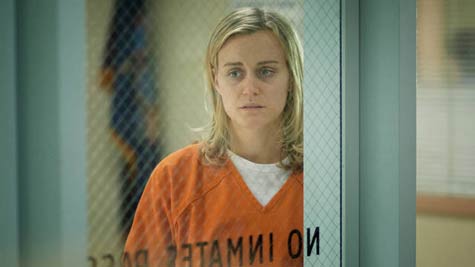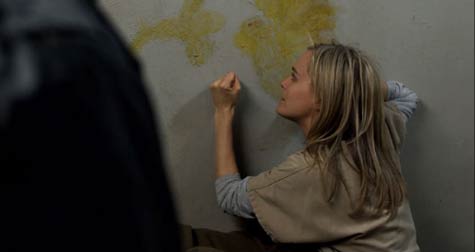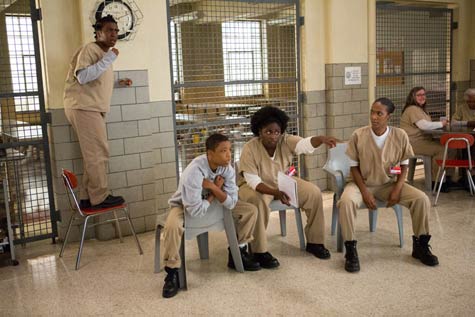
The last time we saw Piper Chapman—in the closing moments of Season 1 of Orange Is The New Black—she was pounding the face of Pennastucky Doggett into sausage. Season 2 begins with Piper sitting in solitary. In the middle of the night, guards come in and whisk her away. She isn’t told were she’s going, and for the rest of the episode she’s finds herself pushed along in a headlong rush toward an unexpected decision. It is a hell of a way to start the season.
On June 6th, Netflix released all thirteen episodes of Orange Is the New Black’s second season. So quickly, for the uninitiated: The show revolves around Piper Chapman (Taylor Schilling), a soon-to-be-married yuppie who is sentenced to 15 months in prison after she’s convicted of transporting drug money for her ex-girlfriend. Once inside, she has to learn to navigate a wide assortment of dangers: the aforementioned Pennastucky, a psychotic religious nut who’s inside for shooting up a women’s health clinic; Red (Kate Mulgrew) the inmate in charge of the kitchen; the lesbian-obsessed chief of the guards, Healy (Michael Harney); and the despicable guard “Pornstache” Mendez (Pablo Schreiber). And to top it all off, she’s stuck inside with her ex-girlfriend Alex (Laura Prepon) while her finance Larry (Jason Biggs) is on the outside getting progressively more jealous.
“Thirsty Bird” is interesting because it opens with Piper in a new context. For the length of the episode, she’s not in Litchfield Federal Prison. Instead, we follow her as she’s pumped through the bowels of the American criminal justice system. I don’t want to give away too much in discussing the twists and turns of the episode because a lot of its impact is found in the way it traps us in Piper’s perspective as it springs new information on her. We don’t get any And-Meanwhile-Back-At-Litchfield scenes to check in on the other characters. This is a smart move because although we miss the old gang, it’s far more effective to be stuck in Piper’s nightmare with her.

From the beginning, Orange Is the New Black has been a show that has walked a thin line between dark comedy and a particularly scary kind of prison drama. The whole tension of the show comes from the fact that Piper is a fish out of water. She doesn’t belong in prison. And what I mean by that isn’t that she’s not a criminal. She is. She committed the crime she’s serving time for. What I mean is, she’s wholly unprepared to be a criminal. Sometimes this is played for laughs, but other times—and “Thirsty Bird” leans hard toward these other times—it’s just scary. The American prison system is a multi-billion dollar machine built around the care and feeding of people who have virtually no claims toward anything approaching civilized treatment. The fascination of a show like Orange Is the New Black is that it constantly places the viewer in the position of wondering how they would fare in a such an environment.
Jenji Kohan, the show’s mastermind, has two salient characteristics as a writer: First, her anti-heroes are resolutely antiheroic. As with her previous show, Weeds, Orange Is the New Black is not a show about nice people pretending to be bad. It is about some seriously flawed folks. Second, Kohan knows how to keep you clicking to the next episode. She never leaves one episode without pushing you toward the next one.

Both of these traits are on full display in “Thirsty Bird.” Piper is faced with a decision that will affect her future and the future of other people. She reacts in true antiheroic fashion. This isn’t to say that she’s a villain. She’s not. She’s just a woman of passions, and those passions—as they do for all antiheroes—lead her to make some questionable choices. There’s a twist toward the end of the episode that is predictable only in the sense that everyone involved just behaves like themselves. Character is destiny, a Greek philosopher once said. It sure as hell is, Jenji Kohan replied.
As to Kohan’s ability to keep a plot hopping, here’s the smartest thing about “Thirsty Bird”: it manages the neat trick of giving us what we like about the show—a dark, quirky humor that supports an even darker human drama—while giving us something new and wholly unexpected. By taking us outside Litchfield, the show manages to put us (along with Piper) in the position of starting over from square one. It’s an exciting place to be.
Jake Hinkson, The Night Editor, is the author of The Posthumous Man and Saint Homicide.
Read all posts by Jake Hinkson for Criminal Element.

Looking forward to your reactions to this season, Jake. I’ve already binged my way through 4 episodes of the new season and I like the way it’s going. It’s the perfect mix of dark and funny.
And it looks like I have some catching up to do myself.